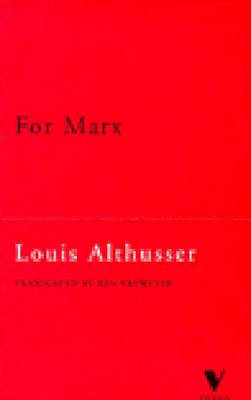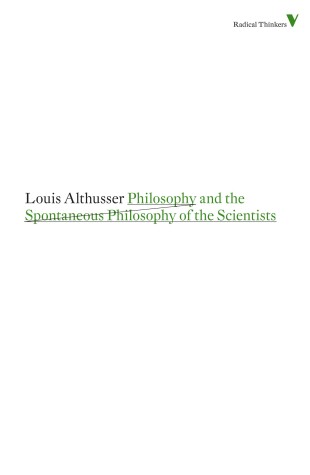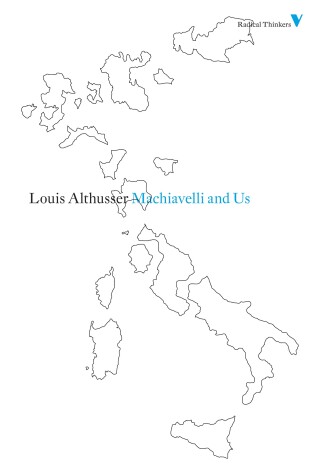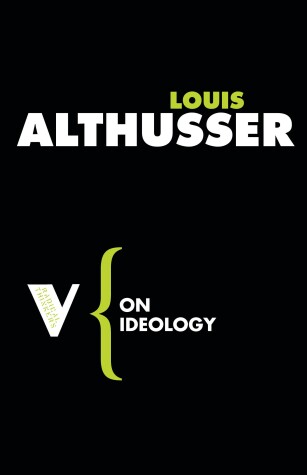Radical Thinkers
7 total works
Series 4
Together with Louis Althusser's book "For Marx," "Reading Capital" represents one of the foundational texts of the school of "structuralist Marxism" which transformed the face of modern philosophy and social theory. Presided over by the magnetic and intellectually coruscating figure of Althusser, the structuralist Marxists attempted no less than an intellectual revolution against dominant interpretations of Marx. Seeking to cleanse Marx of all Hegelian impurities and recast his thought on a rigorously scientific basis, in this work Althusser and one of his most brilliant students and colleagues, Etienne Balibar, subjected Marx's method in "Capital," his critique of classical political economy, and the fundamental terms of historical materialism, to searching textual analysis and challenging conceptual reconstruction. Inaugurating a new way of reading Marx that was to prove both intensely stimulating and capable of generating fierce controversy, Reading Capital is a work that cannot be bypassed by anyone interested in Marxism, and in theory more generally, in this century.
In the first two essays of this book, Louis Althusser analyses the work of two of the greatest thinkers of the Enlightenment – Montesquieu and Rousseau. He shows that although they made considerable advances towards establishing a science of politics, particularly in comparison with the theorists of natural law, they nevertheless remained the victims of the ideologies of their day and class. Montesquieu accepted as given the political notions current in French absolutism; Rousseau attempted to impose by moral conversion an already outdated mode of production. The third essay examines Marx’s relationship to Hegel and elaborates on the discussions of this theme in Althusser’s earlier books, For Marx and Lenin and Philosophy. Althusser argues that Marx was able to establish a theory of historical materialism and the possibility of a Marxist philosophy of dialectical materialism not simply by turning his back on Hegel, but by extracting and converting certain categories from Hegel’s Logic and applying them to English political economy and French socialist political theory.
The publication of "For Marx" in 1965 established Louis Althusser as an original and controversial Marxist philosopher. It contains Althusser's polemic revaluation of Marx's early works, his essay on "Contradiction and Overdetermination" and other articles on philosophy, ideology and aesthetics. Other works by Louis Althusser include "Reading Capital", "Montesquieu", "Rousseau and Marx" and "Essays in Ideology". The book has come to be regarded as the founding text of the school of "structuralism Marxism" which was presided over by the enigmatic figure of Louis Althusser. Structuralism constituted an intellectual revolution in the 1960s and 1970s, and radically transformed the way philosophy, political and social theory, history, science and aesthetics were discussed and thought about. The book was a key contribution to that process and it fundamentally recast the way in which many people understood Marx and Marxism.
The book contains the classic statements of Althusser's analysis of the young Marx and the importance of Feuerbach during this formative period, of his thesis of the "epistemological break" between the early and the late Marx, and of his conception of dialectics, contradiction and "overdetermination". Also included is a study of the materialist theatre of Bertolazzi and Brecht and the critique of humanist readings of Marxism. Since his death in 1990, Althusser's legacy has come under renewed examination, and it is increasingly recognized that the influence of his ideas has been wider and deeper than previously thought.
The book contains the classic statements of Althusser's analysis of the young Marx and the importance of Feuerbach during this formative period, of his thesis of the "epistemological break" between the early and the late Marx, and of his conception of dialectics, contradiction and "overdetermination". Also included is a study of the materialist theatre of Bertolazzi and Brecht and the critique of humanist readings of Marxism. Since his death in 1990, Althusser's legacy has come under renewed examination, and it is increasingly recognized that the influence of his ideas has been wider and deeper than previously thought.
Philosophy and the Spontaneous Philosophy of the Scientists
by Louis Althusser
Published 16 January 2012
The publication in 1965 of For Marx and Reading Capital established Louis Althusser as one of the most original and controversial figures in the Western Marxist tradition; a thinker whose renewal of Marxism was to enjoy great influence over the next decade.
Collected here are Althusser’s most significant philosophical writings from 1965 to 1978; the majority previously untranslated. Intended to contribute, in his own words, to a “left-wing critique of Stalinism that would help put some substance back into the revolutionary project here in the West,” they are the record of a shared history. At the same time they chart Althusser’s critique of the theoretical system unveiled in his own major works, and his developing practice of philosophy as a “revolutionary weapon.”
The collection opens with two lucid early articles—“Theory, Theoretical Practice and Theoretical Formation” and “On Theoretical Work.” The title piece—Althusser’s celebrated lectures in the “Philosophy Course for Scientists”—is the fullest exploration of his new definition of philosophy as politics in the realm of theory; a conception which is further developed in “Lenin and Philosophy.” “Is it Simple to be a Marxist in Philosophy?” provides an invaluable account of Althusser’s intellectual development. The volume concludes with two little-known late pieces—“The Transformation of Philosophy,” in which the paradoxical history of Marxist philosophy is investigated; and “Marxism Today,” a sober balance-sheet of the Marxist tradition.
Attesting to the unique place which Althusser has occupied in modern intellectual history—between a tradition of Marxism which he sought to reconstruct, and a “post-Marxism” which has eclipsed its predecessor—these texts are indispensable reading.
Collected here are Althusser’s most significant philosophical writings from 1965 to 1978; the majority previously untranslated. Intended to contribute, in his own words, to a “left-wing critique of Stalinism that would help put some substance back into the revolutionary project here in the West,” they are the record of a shared history. At the same time they chart Althusser’s critique of the theoretical system unveiled in his own major works, and his developing practice of philosophy as a “revolutionary weapon.”
The collection opens with two lucid early articles—“Theory, Theoretical Practice and Theoretical Formation” and “On Theoretical Work.” The title piece—Althusser’s celebrated lectures in the “Philosophy Course for Scientists”—is the fullest exploration of his new definition of philosophy as politics in the realm of theory; a conception which is further developed in “Lenin and Philosophy.” “Is it Simple to be a Marxist in Philosophy?” provides an invaluable account of Althusser’s intellectual development. The volume concludes with two little-known late pieces—“The Transformation of Philosophy,” in which the paradoxical history of Marxist philosophy is investigated; and “Marxism Today,” a sober balance-sheet of the Marxist tradition.
Attesting to the unique place which Althusser has occupied in modern intellectual history—between a tradition of Marxism which he sought to reconstruct, and a “post-Marxism” which has eclipsed its predecessor—these texts are indispensable reading.
Set 5
"We do not publish our own drafts, that is, our own mistakes, but we do sometimes publish other people's," Louis Althusser once observed of Marx's early writings. Among his own posthumously released drafts, one, at least, is incontestably neither mistake nor out-take: the text of his lecture course on Machiavelli, originally delivered at the ecole Normale Superieure in 1972, intermittently revised up to the mid-1980s, and carefully prepared for publication after his death in 1990. Though only appearing as an occasional reference in the Marxist philosopher's oeuvre, Machiavelli was an unseen constant presence. For together with Spinoza and Marx, Machiavelli was a veritable Althusserian passion. Machiavelli and Us reveals why, and will be welcomed for the light it sheds on the richly complex thought of its author.
Throughout the 1960s and 1970s, Louis Althusser enjoyed virtually unrivalled status as the foremost living Marxist philosopher. Today, he is remembered as the scourge and severest critic of "humanist" or Hegelian Marxism, as the proponent of rigorously scientific socialism and as the theorist who posited a sharp rupture - an epistemological break - between the early and the late Marx. This collection of texts from the period of 1945-1953 turns these interpretations of Althusser on their head. Readers discover that there was a "young Althusser", as well as the "mature Althusser" people are already familiar with. In his Masters thesis, "On Content in the Thought of G.W.F. Hegel" (1947), Althusser developed a position which he was later to attack ferociously: namely, that the revolutionary potential of the Hegelian dialectic could be defended against Hegel's own political convervatism. Althusser is seen wrestling with the spectres of Hegel and of Catholicism in another long text, his letter to Jean Lacroix and, finally, his own "epistemological break" is shown in the piece "On Marxism" from 1953.
Other texts included are his critique of Alexander Kojeve (whose interpretation Francis Fukuyama has recently revived), and his attack on the French Church's teachings on women, sex and the family. This collection not only gives an insight into the formation of this major intellectual figure, but should also restore the "unknown Althusser" to the centre of the history of Marxism and of philosophy since World War II. Louis Althusser is the author of "For Marx", "Reading Capital", "Essays in Ideology", and "Philosophy and the Spontaneous Philosophy of the Scientists".
Other texts included are his critique of Alexander Kojeve (whose interpretation Francis Fukuyama has recently revived), and his attack on the French Church's teachings on women, sex and the family. This collection not only gives an insight into the formation of this major intellectual figure, but should also restore the "unknown Althusser" to the centre of the history of Marxism and of philosophy since World War II. Louis Althusser is the author of "For Marx", "Reading Capital", "Essays in Ideology", and "Philosophy and the Spontaneous Philosophy of the Scientists".
Set 3
This major voice in French philosophy presents a classic study of how particular political and cultural ideas come to dominate society. Spanning the years 1964 to 1973, On Ideology contains the seminal text, “Ideology and Ideological State Apparatus” (1970), which revolutionized the concept of subject formation. In “Reply to John Lewis” (1972–73), Althusser addressed the criticisms of the English Marxist toward On Marx and Reading Capital. Also included are “Freud and Lacan” (1964) and “A Letter on Art in Reply to André Daspre” (1966).




